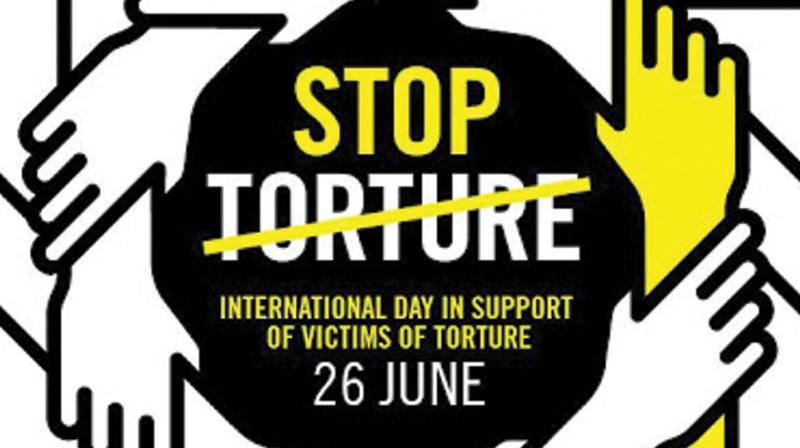Chennai: Anti-torture efforts yet to see light of the day

Chennai: The United Nations International Day in support of victims of torture is observed on June 26 every year. It marks the moment in 1987 when the UN Convention Against Torture and Other Cruel, Inhuman or Degrading Treatment or Punishment came into effect.
This is a day to speak up against the unspeakable. This is a day on which we pay our respects to those who have endured unimaginable pain, a day to honour and support victims and survivors throughout the world, and to stand in with all those whose lives have been marked by torture.
Why a day in support of victims of torture? Freedom from torture notes that it is a basic human right that no one should be subjected to torture or inhuman punishments.
This also applies to cases of severe violence in police custody and poor conditions in detention. There are so many types of tortures that were used depending on the victim's crime, gender, and social status. The history of torture throughout the ages reveals that torture was employed by various communities either in their religious rites or its code of punishment. In India, some communities have been undergoing torture for ages.
The government itself has enforced certain laws and brought specific communities under torture.
'The Criminal Tribes Act', is one of the many laws passed by the British colonial government that applied to Indians based on their religion and caste identification. The Act was first put into practice in 1871 as 'The Criminal Tribes Act' in North India, but finally, enacted on the whole country with the Criminal Tribes Act 1911. However, after protests and fights by various progressive organisations in the country, the Act was repealed and replaced and the 'Habitual Offenders Act' was enacted in its place. But still, the stigma is continuing in the community and they are branded as thieves.
Recently, Ravi, a daily wage labourer belonging to the Hindu Kurava community, a resident of Elavanasar Kottai, Ulundurpet taluk in Villupuram district, was subjected to such a torture. According to reports, totally three cases were filed against him. Among the three, the third case related to an alleged bank robbery, where the Thirunavalur police forcefully had taken Ravi at midnight from his house in the name of enquiry, and he was detained and brutally beaten up and tortured. He died due to severe police torture while in custody in the police station itself.
After Ravi' death, police hatched a false story saying that he was taken to the police station for an enquiry, and when he tried to escape from the station, he fell down into a pit and died.
The family had spent around Rs 1 lakh on all the false cases filed against Ravi. Now, his wife is struggling to survive with four kids, and all of them are studying in a government school, and she takes care of the family by pig rearing.
Later, a special team was appointed to probe the robbery case, which subsequently caught the real accused and they were arrested.
In no way Ravi was part of the robbery, but he lost his life, only because he belonged to the Kurava community.
The same is the case of Mathiazhagan who belonged to the same community, working as a sweeper and rearing pigs, residing at Kurivadipatti in Thanjavur district. Six false cases were foisted against him and he was detained for 80 days in different police stations. He was subjected to brutal torture with his legs and hands tied to his back. He was hung upside down, and his nails pulled off using a cutting blade. He had spent around Rs 8 lakh on his cases, and he managed this expenditure by selling pigs and pawning jewels and land he had in hand.
Most of the families have migrated to various other districts due to the frequent false cases filed against them. These people are implicated under false cases by police only because of their caste identity and their marginalization.
The obligation of States is not only to prevent torture, but also provide all torture victims compensation and appropriate social, psychological, medical and other forms of rehabilitation, which is very rarely done.

